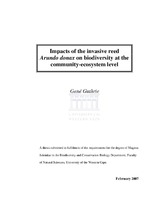Impacts of the invasive reed Arundo donax on biodiversity at the community-ecosystem level
Abstract
Arundo donax is an invasive species that mostly impacts on sensitive riparian ecosystems. Arundo is also invasive in South Africa, though less is known about its ecology, biology, and impacts. Since California and the Western Cape of South AFrica have similar Mediterranean-type climates, we could assume that the impacts of Arundo on ecosystems in California are likely to be similar in the Western Cape, and that control methods used could be extrapolated for use in South Africa. This thesis attempted to determine what impact Arundo has on biodiversity at the community-ecosystem level.

